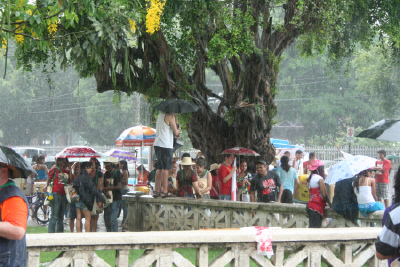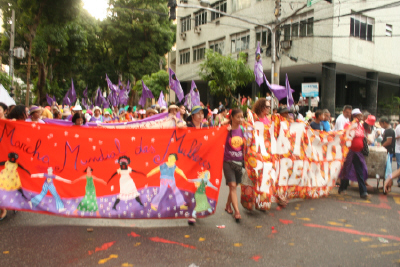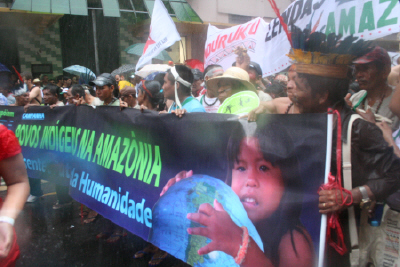“Nobody, No, Nobody is Gonna Rain on My Parade!”
“I simply gotta march, my heart’s a drummer; nobody, no, nobody is gonna rain on my parade!”
I remembered the lyrics of this song, first sung by Barbra Streisand I think, as we marched – some 100,000 of us – in a torrential downpour through the streets of Belém, at the mouth of the Amazon in the Brazilian state of Pará. It was the Opening March of the 2009 World Social Forum. Despite the rain, the enthusiasm of the crowds was contagious.

Music, singing, and drumming accompanied the robust chanting of slogans. I was part of the joint delegation of the Funders Network on Trade and Globalization and the Grassroots Global Justice Alliance. We marched with the Marcha Mundial das Mulheres (World March of Women), whose drumming and unique style of running and marching kept us all going.

Almost 150,000 people descended on this small port city, most of them from Brazil (a third of the total participants were from Pará). A major reason to hold the gathering here, rather than the southern city of Porto Alegre in Rio Grande do Sul state where it’s been held a number of times, was to highlight the importance of the Amazon ecosystem for the world in the context of climate change; to show how fragile it is; and to show how it’s been devastated by deforestation, mining, and hydroelectric projects.
Atossa Soltani of our ally Amazon Watch observed that when the Amazon Alliance was planning the creation of a massive human banner on the first day to emphasize the dire situation indigenous peoples in the Amazon were in, there was a debate on whether the banner should read “Save” or “Defend” the Amazon.

The Amazonian Indians argued that it should be “Save the Amazon!” to impress upon the world that “we’re losing time.” They observed that they had been defending the Amazon for so long, and yet have continued to lose land, water, forests, species, and their way of life. The time to defend the Amazon was over, they said. It was time to save it.
Photos courtesy of Sandra Yu, Detroiters for Environmental Justice
